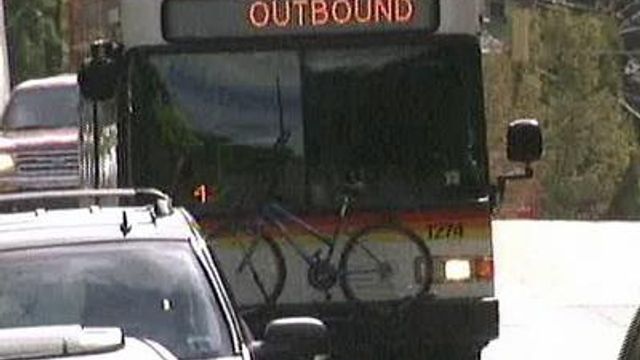Traffic
Regional transit great for some, no help for others
High gas prices and congested roads are prompting thousands of people to use mass transportation, but others say it's inconvenient and too time-consuming.
Posted — UpdatedRALEIGH, N.C. — Catching up on a good book or with an old friend, or even on some much-needed sleep – passengers say these are just some of the personal benefits of mass transit.
"Then, when you get to the office, you're refreshed, ready to go without having to fight the frustration of the drive in every morning," says Scott Poole, who uses the bus every day to get from his Wake Forest home to downtown Raleigh.
In fact, most riders who regularly take the route say they save a significant amount in gasoline costs.
"I can put $25 in my gas tank, and it can last two weeks," says passenger Sharell Macklin. "A lot of people can't say that."
High gas prices and congested roads are pushing thousands of people like Poole and Macklin from behind the driver's wheel and into the passenger seats of buses and shuttles.
For example, the Triangle Transit, formerly the Triangle Transit Authority, says ridership from April through August was up 29 percent from the same period last year.
And in June, monthly ridership hit an all-time high with more than 97,700 people taking either form of mass transportation – a 30.2 increase compared with figures from the same time a year ago.
But taking the bus isn't for everybody. Some say it is inconvenient and too time-consuming.
Every morning, Warren Rocque drives for about 25 minutes from his home in North Raleigh to Research Triangle Park.
According to Triangle Transit's online "Trip Planner," if he were to ride the bus, he'd be on for 81 stops – or more than two hours – before he gets to his stop. He'd then have to walk more than a mile to get to his office.
"That's unacceptable," Rocque says.
Triangle Transit general manager David King admits bus service is not for everyone, but says the long-term plan is to add more routes and offer more express buses.
"Everybody's situation is different," he said. "With the best bus service we could possibly provide, we probably wouldn't be able to carry 12 or 15 percent of the total commuters in the region."
Triangle leaders are considering a multibillion-dollar plan that would include rail systems and "circulators" to help meet the area's growing transportation needs.
The Special Transit Advisory Group, a 38-member citizen advisory group, spent a year developing the plan, which could be in place as early as 2035, when an estimated 1 million people are expected to have moved into the area.
In addition to an enhanced bus network throughout the Triangle, the plan includes rail service from Chapel Hill to north Raleigh utilizing diesel rail cars and Light Rail Transit that would provide transportation alternatives in some of the most congested corridors of the Triangle.
To fund the plan, Wake, Durham and Orange county voters would likely see a tax referendum for a half-cent sales-tax increase and a $10 increase in vehicle registration fees.
Fifty percent of funding for the system would come from local governments, and 25 percent each from the state and federal governments.
• Credits
Copyright 2024 by Capitol Broadcasting Company. All rights reserved. This material may not be published, broadcast, rewritten or redistributed.





